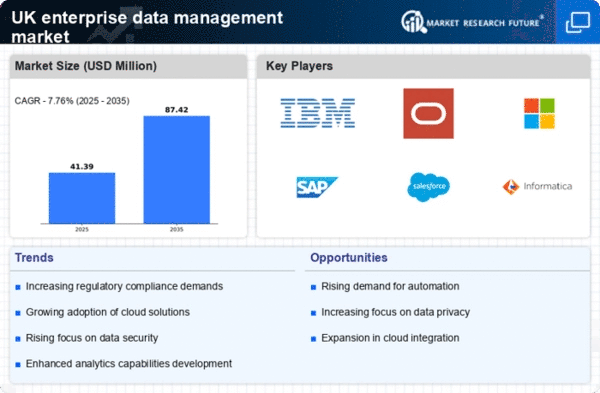Increased Focus on Data Security
The enterprise data-management market is seeing a surge in focus on data security. This is driven by the escalating threats of cyberattacks and data breaches. With the UK experiencing a notable increase in cyber incidents, organisations are compelled to prioritise the protection of sensitive data. According to recent statistics, 43% of UK businesses reported experiencing a cyber breach or attack in the past year. This alarming trend has prompted enterprises to invest heavily in data management solutions that incorporate advanced security features, such as encryption and access controls. The emphasis on safeguarding data not only protects organisational assets but also builds customer trust, which is crucial in maintaining a competitive edge. As the landscape of cyber threats continues to evolve, the enterprise data-management market is likely to expand as businesses seek to fortify their data security measures.
Emergence of Big Data Technologies
The enterprise data-management market is significantly shaped by the emergence of big data technologies. These technologies enable organizations to process and analyze vast volumes of data efficiently. As businesses in the UK generate unprecedented amounts of data, the need for robust data management solutions becomes increasingly critical. The integration of big data technologies, such as Hadoop and NoSQL databases, allows enterprises to harness the power of data analytics, leading to improved operational insights and customer engagement. A report indicates that the big data market in the UK is projected to reach £1.2 billion by 2026, highlighting the growing importance of data management in leveraging big data. Consequently, organisations are investing in enterprise data-management solutions that can seamlessly integrate with big data technologies, thereby driving market growth and innovation.
Rising Regulatory Compliance Requirements
The enterprise data-management market is experiencing heightened demand due to increasing regulatory compliance requirements in the UK. Businesses are compelled to adhere to stringent data protection laws, such as the General Data Protection Regulation (GDPR), which mandates robust data management practices. This regulatory landscape necessitates the implementation of comprehensive data governance frameworks, thereby driving investments in enterprise data-management solutions. As organisations strive to avoid hefty fines, which can reach up to £17.5 million or 4% of annual global turnover, the market is likely to witness a surge in demand for compliance-oriented data management tools. Furthermore, the need for transparency and accountability in data handling is pushing enterprises to adopt advanced data management systems that ensure compliance and mitigate risks associated with data breaches.
Growing Demand for Data-Driven Decision Making
In the current business environment, the enterprise data-management market is significantly influenced by the growing demand for data-driven decision making. Companies are increasingly recognising the value of data as a strategic asset, leading to a shift towards data-centric business models. This trend is evidenced by a report indicating that 67% of UK businesses are prioritising data analytics to enhance operational efficiency and drive innovation. Consequently, organisations are investing in sophisticated data management solutions that facilitate the collection, storage, and analysis of vast amounts of data. The ability to derive actionable insights from data not only improves decision-making processes but also enhances competitive advantage, thereby propelling the growth of the enterprise data-management market. As businesses continue to seek ways to leverage data for strategic initiatives, the demand for effective data management solutions is expected to rise.
Shift Towards Hybrid Data Management Solutions
The enterprise data-management market is experiencing a shift towards hybrid data management solutions that combine on-premises and cloud-based systems. This trend is largely driven by the need for flexibility and scalability in data management practices. UK organisations are increasingly adopting hybrid models to optimise their data storage and processing capabilities while ensuring compliance with data sovereignty regulations. The ability to leverage both cloud and on-premises resources allows businesses to tailor their data management strategies to meet specific operational needs. As a result, the hybrid data management market is expected to grow, with forecasts suggesting a compound annual growth rate (CAGR) of 22% over the next five years. This shift not only enhances data accessibility but also supports organisations in managing costs effectively, thereby contributing to the overall growth of the enterprise data-management market.

















